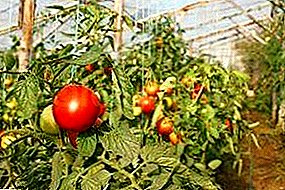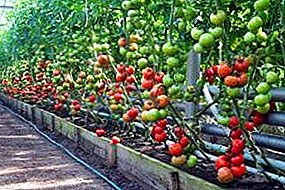
It is not enough just to grow a crop - you also need to save it. In order to indulge her loved ones with various zucchini dishes the whole winter, a good housewife should know some of the details of their storage.
It should be noted that zucchini has many useful vitamins and substances that are so necessary for the human body. Our tips will help you learn how to keep zucchini fresh for the winter in the cellar.
Disinfection cellar
Concern about the preparation of the cellar should be in the summer. To protect your crop from molds and pathogens, the room should be well sanitized. The most affordable way is to whitewash the walls with lime.
To prepare the lime, you will need 1 bucket of lime dough and 5-6 buckets of water. Copper or iron sulphate can be added to the mixture, taken in the following ratio: 1 kg of vitriol per 1 whitewash bucket.
Another popular disinfection method is sulfur dioxide fumigationwhich is detrimental to pests. After igniting the sulfur sulfur or sulfur checkers should leave the room immediately. The doors to the cellar are tightly closed, and it is impossible to enter there for several days. After this time, the cellar or basement opens for ventilation.
But remember that in the middle of a hot day it is better not to ventilate, since the warm air that has entered the room will cause condensation to form on the walls and ceiling.
All available shelves, racks and drawers are best sanitized separately. To do this, they need to be treated with a solution of copper sulfate or formalin, and then taken out onto the street. It will not be superfluous to paint wooden shelves with varnish.
Storage temperature
Recommended temperature for storage of courgettes in the cellar varies from +4 to +10 degrees Celsius. As a heater for a cold cellar fit gas-filled polymeric materials, for example, polystyrene foam.
Optimum humidity
Optimum moisture for storing these vegetables is about 85-90%. Indoors with higher humidity zucchini will quickly rot. Fans or special absorbent substances (for example, slaked lime, potassium chloride, sulfuric acid) can help in the fight against excessive air humidity. But do not forget that excessive dryness is also harmful. In a too dry cellar, zucchini can dry out and lose its juicy taste.
Preferred and unwanted "neighbors"
 To preserve the crop as long as possible, attention should be paid to the issue of product compatibility. As you know, not all fruits can be stored together, since some of them can have a detrimental effect on others.
To preserve the crop as long as possible, attention should be paid to the issue of product compatibility. As you know, not all fruits can be stored together, since some of them can have a detrimental effect on others.
Zucchini can be safely stored next to pumpkins, peppers and cucumbers. But the neighborhood with potatoes, onions and garlic should be avoided, since these fruits can soak zucchini with their smell, and they lose their flavor.
And if you asked the question: “How to save zucchini for the winter in the cellar next to the cabbage and is it possible?”, Then we hurry to upset you, to do so is undesirable. Since the cabbage emits moisture and heat, which will reduce the shelf life of zucchini. Bad neighbors will be apples and tomatoes, emit a large amount of ethylene, which accelerates the ripening of fruits.
Important rules
Before starting to wrestle with the question of how to keep zucchini for the winter in the cellar, it is worth thinking about which varieties are better suited for this. The longest others can keep such thick-skinned winter varieties of zucchini, such as the Golden Cup, Festival, Gribovsky.
From early maturing varieties for storage are suitable: Aeronaut, Pear-shaped, Anchor, Yellow fruit, Arlika, Negro. Italian zucchini zucchini is well preserved, for example, Zolotinka, Gypsy, Black handsome, Zebra, Nero de Milano. In addition to the elongated form, these zucchini differ in thick skin and small seeds.
Prepare zucchini
Only mature fruits can be stored, the skin of which has already hardened and thickened. Such zucchini can be distinguished by the characteristic deaf sound, which is heard when the fruits are tapped. Carefully inspect each zucchini. For storage, only those with no scratches or dents on the peel are suitable. Fruits with damaged skin will quickly deteriorate and the entire crop will be subjected to the same danger. Cut zucchini should be only a sharp knife.
Pay attention to the fruit stem. For long storage, only squash with a dense but juicy stem will be suitable. Over-ripe fruits with a dried stem have already lost their delicate taste and will not last long.
Cutting zucchini, it is necessary to leave a leg of 5-6 cm, which protects the fetus from penetration of pathogens. After harvesting, zucchini should be cleaned and dried in the sun. Under the action of ultraviolet rays, their skin will thicken even more and will be able to better protect the juicy flesh. But wash the squash in no case impossible!
What better to store?
 A good option for storage will be wooden honeycombs with a layer of sawdust inside. If you do not have wooden boxes, you can use ordinary cardboard boxes. Some summer residents prefer to keep squash in the grids fixed to the ceiling.
A good option for storage will be wooden honeycombs with a layer of sawdust inside. If you do not have wooden boxes, you can use ordinary cardboard boxes. Some summer residents prefer to keep squash in the grids fixed to the ceiling.
Racks sprinkled with hay will also be suitable for storage. But remember that zucchini better place on the upper shelves of racks.
Timing
The storage time of zucchini is determined by their grade. Early ripe varieties usually stored no more than a few months. Winter varieties Gold Cup and Gribovsky calmly lie until the middle of winter. Variety Festival can be stored up to 10 months. A zucchini can delight you with their taste until the new harvest.
Different ways
Remember that zucchini should not touch each other. Well proven method of storing fruits in the nets. Each zucchini is placed in a separate grid, which is then hung from the ceiling or high shelves.
If you decide to keep the zucchini on the shelves of shelving, put them in straw, needles or wax paper. Zucchini are laid only in one row, tails up. Place the racks away from the ventilation openings, as squash is very sensitive to cold air.
Besides, each fruit can be wrapped in soft fabric, it will save zucchini from light, which can provoke seed germination, and frost. You can store fruits in wooden boxes or cardboard boxes.
Choosing light varieties and the right container for storage, maintaining the optimum temperature and observing some other simple rules, you can keep your crops as long as possible. We hope that the tips of this article helped you learn how to store zucchini in the winter in the cellar.












